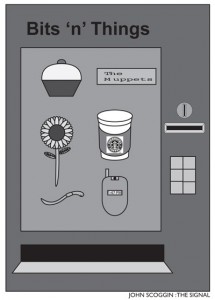Welcome to the new swipe-and-go world

Rosita Gomez
The Signal
Aside from the waiter who carries around change in his wallet from last night’s dinner rush tips, it is usually plastic that weighs down America’s pockets and purses.
It is rare that people ever go to a place where they are not able to use a credit or debit card to make a quick, convenient transaction. The sudden spurt of credit card vending is making convenience prominent in schools and businesses. Companies are exploring a new vending market with products that range from gourmet coffee and cupcakes to digital cameras and GPS navigation systems.
“The population has moved to plastic, making the customer basis much larger,” said Jeffery Forbus, instructor of genetics at UHCL and owner of Promo Vending in League City. “Our society is molded to have everything convenient; novelty attracts people.”
The convenience of swipe and go is transparent, but the costs might be translucent.
Fees of 2.5 to 5 percent are charged by credit card companies and banks to businesses using credit card machines that allow customers to make transactions, not including the cost of equipment and usage.
“Many of the biggest successes with credit/debit payment systems are on glass-front beverage vending machines that are typically only placed in high-end accounts with higher vend prices and higher sales,” states reports by USA Technologies, which provide ePort credit card readers to vending machines seen around the UHCL campus.
Additionally, USA Technologies reports state businesses that see the most success are those that can afford to raise the prices of their vending machine products. The high costs of products inside credit card vending machines help to raise the profit for vending machine suppliers, countering some of the fees charged by credit card companies and banks.
Some of the places people are most likely to see these higher costs are amusement parks, sports venues, schools and airports.
The common link between these places is that once a person is inside, it might be more inconvenient to leave than to pay an extra dollar or two for a needed or desired product in a vending machine.
This brings to question the definition of convenience. Is convenience the ability of a person to use a credit card to purchase a higher-priced vending machine item, or is convenience connected to a location? Or is convenience the ability to make purchases anonymously?
Shippensburg University in Pennsylvania has a vending machine that dispenses the Plan B pill for the cost of $25 at the school’s Etter Health Center. Pennsylvania law does not require a prescription for the pill for anyone 17 or older; therefore, students can obtain the pill with the swipe of a credit card. Convenience, in this particular instance, would be privacy.
Davis Kent, a graphic design major at UHCL, understands the desire for college students who use these vending machines to remain anonymous.
“If they don’t want to deal with people, it’s a lot less embarrassing to get a Plan B pill from a vending machine than a person,” Kent said.
Kent expressed that though it is convenient, there are risks that should be considered. For example, a person’s medical history might not be taken into account when using the vending machine as opposed to meeting with a pharmacist to get the pill. He also points out that people could abuse the Plan B pill by taking it instead of safer prescription birth control contraceptives.
Convenience is a factor considered by vending machine companies. It has been verified by the invention of the credit card kiosks Redbox, owned by Coinstar Inc., which has recently aided in the closing of 500 Blockbuster movie rental stores nationwide
In February, Redbox spent $100 million for ownership of Blockbuster Express kiosks, a National Cash Register Corporation (NCR) competitor, thus making Redbox the sole movie rental kiosk once again.
Coinstar Inc. is now working with Starbucks’ Seattle’s Best Coffee vending machines to explore a different wave of vending services, allowing customers the convenience of freshly brewed coffee at the price of $1 with the swipe of a credit card.
“People will continue to go to Starbucks for the experience of drinking coffee and hanging out on their computers,” Kent said, who has used credit card vending machines many times in the past at College of the Mainland.
Forbus agrees that enjoying the experience is something sacrificed by the growth of credit card vending services.
He used the example of gumball and toy machines for further explanation. He said part of the joy a kid has in using such machines is the fun of putting some spare change in it and watching the gumball drop, or spending $15 in quarters on a toy that costs less than $1. This suggests precedence of experience over convenience.
Forbus’ vending business donates a portion of the proceeds to National Children’s Cancer Society (NCCS). Some of the businesses he services include warehouses and medical institutions. He says his objective is to provide a service and support a cause.
Forbus provides snack and beverage vending through Promo Vending but does not see it necessary to venture into the latest vending product market.
“People want to try new things, but they aren’t necessarily going to last,” Forbus said.
Demographics will no doubt aid in determining which credit card vending machines will be most successful. If people want to relieve themselves of boredom at an airport, it might make sense to visit the Best Buy Express machine to buy a new iPod or NintendoDS video game. Buying a Sprinkles’ cupcake out of its new vending machines, however, might not prove to be as successful in rural Texas as in the greater-Houston area.

